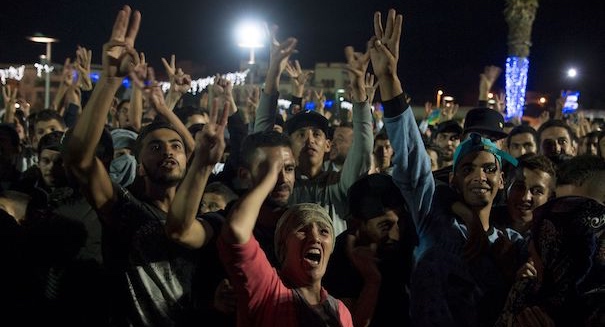The gruesome death of Mouhcine Fikri on October 28 and the ensuing protests across Morocco have raised questions about whether this may be the country’s Mohammed Bouazizi moment—a Tunisia-style revolutionary crossroads. Or is it an echo of Morocco’s own protest movement from five years ago?
This may not be a revolutionary moment for Morocco, but it is equally unclear whether the protests will mark an important political juncture as the 2011 protests did.
In 2011, protests that began on February 20 became an important moment for the country’s politics. They drove the monarchy to initiate a constitutional revision that, in turn, ushered in an Islamist-led coalition cabinet. Unlike other political actors, the country’s Islamists, although they weren’t part of the protest movement, seized on the moment to catapult themselves into government. Today, however, and given that the regional mood is markedly different from the one that prevailed in 2011, what sort of impact might the recent protests have?
The protests started in Al-Hoceima and spread across northern Morocco, then to the rest of the country, after Mouhcine Fikri, a fish vendor, was crushed to death after diving into a garbage compressor last Friday to retrieve his confiscated fish (the value of which was reportedly around $11,000). The details of why the man was crushed have yet to be established. The Interior Ministry has launched an investigation and local notables and officials have promised to bring swift justice to those culpable. The government’s robust response followed an outcry across Morocco that was amplified by national and social media. Moroccans shared pictures and videos of the incident and hashtags such as “we are all Mouhcine Fikri” and “grind him”—a phrase that was allegedly heard before the fish vendor was killed. Driving the sense of indignation was a feeling among many Moroccans that officials consider human life and dignity cheap.
Alongside the visceral popular reaction, there is also an important political issue linked to Fikri’s death and the subsequent protests. While immediate political necessity means that someone will be punished, there is the larger issue of who is accountable when something goes wrong in Morocco. Who is responsible for the entrenched disdain for average citizens?
The dichotomy of Moroccan politics is such that political actors and elected officials are traditionally held accountable in public rhetoric, but they wield the least authority when it comes to governing and decisionmaking. The powers that are firmly in control—the monarchy and its vast circle of advisors, administrators, and officials—remain above accountability and questioning.
As a result, for politicians and political parties the protests present a dilemma: Several parties have voiced their outrage at the death and called for an investigation into the events (some voiced solidarity with protesters), but most have been absent from the protests themselves (with the exception of the largely politically marginalized Unified Socialist Party, whose leader gave a passionate plea for accountability and citizens rights). So it remains that only the king can—and will—play the role of arbiter and sole savior.
This caution is not unusual for Morocco’s main political parties, particularly the Justice and Development Party (PJD), whose leader, Abdelilah Benkirane, is set to become prime minister again after recent parliamentary elections. In 2011, as Arab Spring protests began to materialize in the kingdom, most mainstream parties did not explicitly endorse the emerging February 20 movement (only the Socialist Union of Popular Forces eventually, and tepidly, supported it).
Once again, the struggle is evident in the response of Benkirane. Currently in negotiations to form a government, he has expressed his condolences to the family, but gave directives to his party members that they not “react” to the calls for protests “in any way.” While the PJD hinted that it wanted to avoid politicizing what was a tragic event, in reality the strategy is likely part of Benkirane’s survivalist political instincts to steer clear of an issue that—at least for the moment—offers little benefit to the PJD.
Although acknowledging the tragedy is politically safe, it is dangerous to raise questions about the actions of a police officer or any other state agent, or about the broader issue of accountability. First, Benkirane may have concerns that he, an elected official about to begin his second term as prime minister, could, potentially, be the target for at least some of the popular anger. And second, he likely realizes that pushing too hard for government accountability could be viewed as an implicit attack on the palace.
The Party for Authenticity and Modernity (PAM)—which took the second highest number of seats in the elections and vowed to remain in the opposition—is taking a different tack. A party of notables, officials, and palace loyalists, the PAM has, paradoxically, been more vocal in its support of the protests. Perhaps it views this as an opportunity to score politically against the PJD. Or maybe the PAM feels that it has more leeway to be critical when this is politically expedient, but that such actions will not threaten the party’s standing given its closeness to the palace. However, even for the PAM condemnation is not without risk. The party could be seen as hypocritical for speaking out against a system of which it is an extension.
In the end, it may take more that this incident to change political dynamics and the lack of accountability among the real agents of power in Morocco. Those immediately responsible for Fikri’s death may be the only ones who are sanctioned. But as moments of anger come and go—especially as the public is increasingly vocal with its anger—true accountability will increasingly be demanded.






